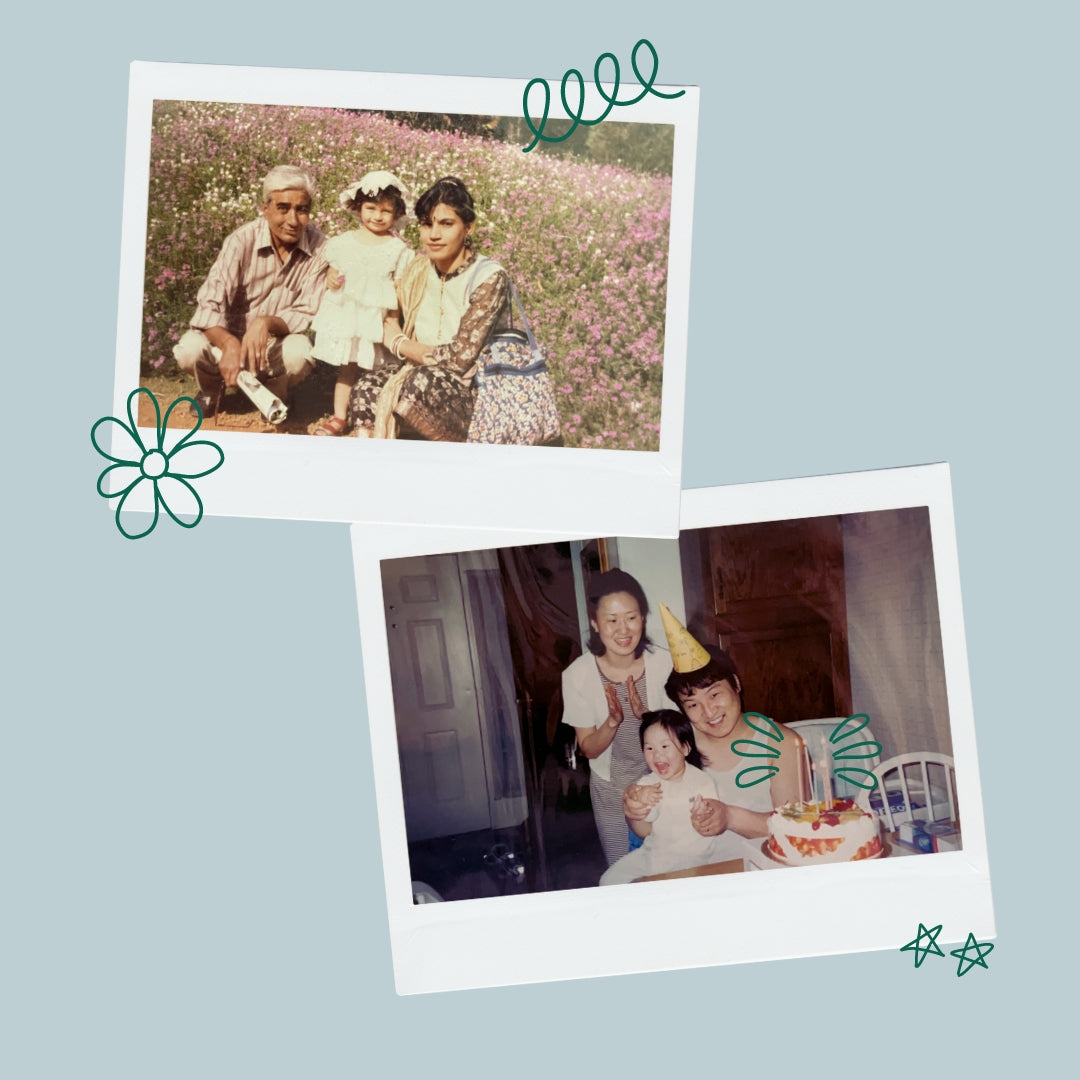As a proud South Asian-founded company, we at Mindhappy could not pass by this month without closing out #AAIPHM with some excerpts of love letters from a couple of our team members who take pride in their Asian heritage and culture, and reflect on how their own identities and experiences have shaped their relationships to creativity, mindfulness, and intention.
Sending a big “love you” to our AAPI community! 🫂
"As an immigrant growing up in a community-based culture, my childhood was a tapestry of shared moments and simple joys. Neighbors were not just people who lived next door; they were friends and extended family. Our evenings were spent sitting in the courtyard, surrounded by multiple families, sharing stories, laughter, and meals. Summers were a time of sweet indulgence, enjoying icy treats with my cousins, while winters brought us closer together, huddled around the fire, listening to our grandparents recount tales of the past.
This way of life, deeply rooted in the principles of slow, intentional living and mindfulness, has been a part of Indian culture for thousands of years. Practices such as yoga, which emerged over 5,000 years ago, harmonize the body, mind, and spirit through postures, breathing techniques, and meditation. Ayurveda, the ancient Indian system of medicine, emphasizes balance and harmony with nature through mindful eating and living. These traditions foster a deep connection with the present moment and a holistic approach to well-being.
Ancient India's emphasis on creativity and play was also integral to daily life. From intricate temple carvings and elaborate textiles to classical music and dance forms like Bharatanatyam and Kathak, creativity was intertwined with cultural and spiritual practices. These art forms were not just entertainment but expressions of devotion, storytelling, and community bonding.
Coming to America presented a stark contrast to this familiar way of life. The population density was much lower, and the sense of community that I had known was not as readily apparent. Adjusting to this new environment was challenging, to say the least. And making friends and keeping them became an intentional effort. In a place where I was used to being surrounded by people, I suddenly found myself uncomfortable with ample space and time to reflect.
Ironically, this solitude ended up being necessary for self-discovery. Surrounded by so many people before, I had never taken the time to truly get to know myself. Now I was able to examine what was meaningful to me and what I wanted to create in my life. I began to appreciate the principles of slow, intentional living and mindfulness that were deeply rooted in my heritage.
In the end, the dots connected in ways I could never have anticipated. My journey from a close-knit community to a more individualistic society taught me the value of both worlds, blending the richness of my cultural heritage with the opportunities for personal growth and creativity that my new environment provided.
In celebrating AAPI month, I reflect on how the ancient practices of mindfulness and intentional living from India continue to shape my life. They serve as a reminder that, regardless of where we are, we can cultivate a sense of community, creativity, and inner peace by living intentionally and mindfully."
Love, Darshita (Mindhappy Founder)
"I am the eldest immigrant daughter of immigrant parents. Yes, already those who know can understand just exactly how loaded that one claim can be. Growing up in an immigrant South Korean household as the eldest in many ways gave me opportunities to understand my own heritage and culture—especially the differences.
In Korean culture, collectively people tend to be fast-paced. Merits are highly valued as well. Big name schools, impressive resumes, and extremely high standards of hard work, talent, and knowledge are especially important. An emphasis on math and science being especially important. Of course, all of these cultural aspects are due to several factors: growing exponentially from a past state of a smaller and poorer country, a historically imbued importance of education, and much much more. Whatever you do, you must be good, and you must be the best (Wow, thank you fear of failure!). A universal sentiment of many East Asian cultures.
Ever since I was younger, I’ve always been a bit sensitive with how I spend my time; I liked taking my time and hated being rushed, expressing myself however I wanted to through activities I liked doing, and always looking to spending my time peacefully that is healing to me. I suppose looking back, I valued it even more thinking about the responsibility of maturing younger being the Korean-American eldest daughter.
But as I grew up, in a way my own Asianness helped me to look for the importance of incorporating creativity, mindfulness, and joy within my own life and habits, and even the very culture I was raised within. It was about unlearning perfection and doing things simply because of the process and fun. Seeing creativity as a strength in any aspect—the value of being intentional.
And it’s not to say South Korea is completely riddled of that— it is a country absolutely rich of culture, creative artistry, and more. A famous Korean Independence Freedom Fighter and favorite Korean poet of mine, Yun Dong-ju, beautifully expressed the sentiment of trauma, fear, guilt, and freedom within poetry. He showed how one could fight with a pen, and not just a sword.
I’ve fought a long inner battle with the differences between the two worlds I belong to, but have learned embracing both is what helped me grow and realize what is true to me. As AAPI month comes to a close, it’s not just this month that serves to remind me how my culture and heritage has shaped me, but how my whole life and experience has led to this very moment in the lessons I’ve learned of how I value creativity, mindfulness, and intention every single day."
Love, Jin (Branding & Social Media Lead)
